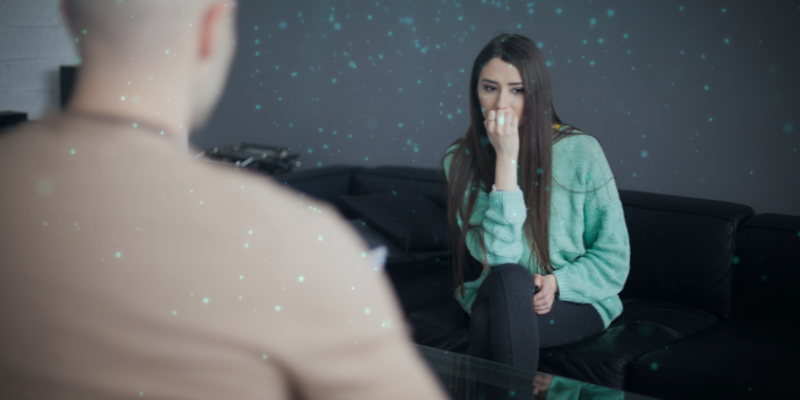
In August, former First Lady Michelle Obama revealed on her podcast that “I am dealing with some form of low-grade depression.” She’s not the only one. Pandemic-related depression is sweeping across the nation and around the world. A survey in JAMA Network Open found that the rate of depression symptoms in the U.S. increased more than 3-fold during the COVID-19 pandemic, jumping from 8.5% before the pandemic to nearly 28%.
But depression has also been linked to having COVID-19. A 2020 study in the Journal of Alzheimer’s Disease shows that one of the consequences of COVID-19 includes depression, in addition to anxiety, attention problems, obsessive compulsive disorder, memory loss, and more. Another 2020 study appearing in the journal Laryngoscope found that in people with COVID, experiencing a loss of smell and taste was associated with depressed mood and anxiety.
New research shows that up to 80% of people with COVID report experiencing anosmia, or the loss of smell. Surprisingly, depression and anxiety were more likely to be found in people with olfactory dysfunction than in those with other symptoms, such as shortness of breath, fever, or cough.
THE SCIENCE OF SMELL AND MOOD
A wealth of scientific research has shown that our sense of smell and our moods are intertwined. For example:
- When scientists chemically blunted the sense of smell in mice for a 2018 study, it induced depressive behavior in the rodents.
- In another study on elderly Koreans, an impaired olfactory function was associated with a significantly higher degree of depression in addition to lower cognitive performance and decreased quality of life.
- A 2016 review of the existing research on anosmia and depression showed that the relationship appears to be a 2-way street. People with depression are more likely to have problems with a sense of smell than healthy controls, and people with anosmia are more likely to have symptoms of depression. And the greater the loss of smell the more severe the depressive symptoms.
SENSE OF SMELL AND EMOTIONS IN THE BRAIN
The area of your brain involved with smell (olfactory cortex) is located near your limbic system (the brain’s emotional centers), including the hippocampus, which is involved with mood and memory. These areas tend to deteriorate and die together.
Not only is the loss of smell associated with depression, but it is also linked to memory loss and Alzheimer’s disease. Having trouble smelling peanut butter, lemon, strawberries, or natural gas is associated with a higher incidence of significant memory problems, according to research. Scoring poorly on a smell test is considered a warning sign of Alzheimer’s disease later in life.
If you experience a diminishing sense of smell or the sudden loss of your ability to identify scents, it may be a sign of trouble. Take note of any other health symptoms (fever, cough, fatigue) that may be related to COVID-19, and take stock of your emotional well-being and memory to see if you notice any changes. Be sure to make an appointment with a healthcare professional.
SMELL THE ROSES
To improve your sense of smell, give your sniffer a daily workout. There is evidence that repeated exposure to certain odors can improve the ability to smell. In a study from Aristotle University in Greece, 111 patients with anosmia repeatedly trained their sense of smell twice a day using 4 odors (phenyl ethyl alcohol, eucalyptol, citronellal, eugenol). After 8 weeks, compared to a control group, participants noticed significant improvement that lasted up to a year. If you have this issue, put your nose to work.
Certain scents have also been found to improve mood and ease depression. Essential oils that support healthy moods include lavender, chamomile, rose oil, lemon, and jasmine.
Depression, memory loss, and other mental health issues can’t wait. During these uncertain times, your mental well-being is more important than ever and waiting until life gets back to “normal” is likely to make your symptoms worsen over time.
At Amen Clinics, we’re here for you. We offer in-clinic brain scanning and appointments, as well as mental telehealth, remote clinical evaluations, and video therapy for adults, children, and couples. Find out more by speaking to a specialist today at 888-288-9834. If all our specialists are busy helping others, you can also schedule a time to talk.





Smell the Roses. Sounds like something Dad always repeated to me.
So, yesterday, I pointed out this article to my mom. She has lost the majority of her sense of smell and taste; it has something to do with Asthma, the removal of polyps, and probably something along the lines of Diabetes, maybe akin to something to do with the confusion brought with age, the red and the white blood cells begin to crash like an oversubscribed Ethernet, traffic > 50%.
She asked me, “So, what happens to those with a failing sense of smell and taste, potentially scaring the neurons between her ears? Might that begin to stimulate the chaos between this so labeled Hippocamus and the Limbic system, my understanding, so near, too afar. (one just might consider that, though light might travel at some Speed of Light, Neurons just might travel Faster; please, don’t confuse this with Superman and speeding bullets, this is way beyond that!)
My answer was rather simple, “I think I’m gonna have to consult with The Doctor to see if smell’n all them scents the best way to be; else, might there become another prescription for Thee, Mama.”
There just might be more questions for Thee, Doc. We’re prolly only a couple % of the way there. The truths are there, some of which we just might not have contemplated, just yet. On to the Future!
penned by an Indian
Comment by Alabama.Brian — October 2, 2020 @ 8:32 AM
Really good information, Indo believe I will begin keeping some vials with things to smell as I think there is really something to this. If TMS alleviates depression as we see all the time, will improving the ability to smell be a guide to measure improvements in depressive symptoms!
Comment by William Shryer — October 7, 2020 @ 5:10 AM
Though I had a negative COVID test, I lost me sense of taste and smell. I can attest to the research in this article.
Comment by Shannkn — October 7, 2020 @ 5:27 AM
About ten years ago I had a mild stroke. I temporarily lost feeling in one arm and the side of my face, permanently lost most of the hearing in one ear, and my sense of taste and smell went wacky. If I smelled something bad, the smell would linger with me all day, long after the source of the smell was gone. All food tasted horrible, and it seemed it was a different flavor every day – burned rubber, skunk, bad imitation cheese, etc. If I had needed to lose weight, that might have ben a good thing, but I’ve always been skinny. I finally decided to see if I could re-train my brain by eating strong flavors. I got a bag of sour candies and found that if I ate one just before a meal, the food tasted tolerable. Then one day the “flavor of the day” was galvanized lemons. I figured I knew how to drown out that bad taste – take a zinc lozenge! To my amazement, the next morning my sense of taste had returned to normal! I figured maybe my brain was recovering. But by the day after that, it was back to bad. A week later I thought I was coming down with a cold, so I took a zinc lozenge to ward it off. Again, the next morning my sense of taste was back to normal. Coincidence? To find out, I went on line to research loss of sense of smell and taste. I discovered that zinc deficiency is a known cause of loss of sense of smell. I also learned that the blood pressure medication they had out me on after my stroke is known to keep the body from utilizing zinc. Now I take 100 mg zinc every day. If I run out or miss a day, things start to go haywire again – in fact there have been times when I have forgotten to take my pills due to some disruption in my schedule, and have been rudely reminded by the bad taste in my mouth.
Comment by Roberta — October 7, 2020 @ 5:36 AM
I came down with Covid September 21st.
I lost my sense of smell and taste. I’ve experienced memory loss, anxiety, anger, depression and fatigue just as your article describes. My husband is still in the hospital with Covid pneumonia. I take two NeuroLink, two Neurovite and two serotonin mood support daily. I’m wondering if I should be taking more until my symptoms improve. The thing I’ve been the most frustrated with is the feeling I can’t focus or gather my thoughts. My brain feels high jacked.
Thank you for your article about this.
Comment by LeClear Joni D — October 7, 2020 @ 6:57 AM
I am pretty sure I had Covid early on. I had the complete loss of taste before that was identified as a symptom. I have always had up and down moods, but by June I was really struggling: extreme fatigue, body aches, catatonic-unmotivated depression. I started researching dopamine deficiency and could not believe ALL MY SYMPTOMS suddenly made perfect sense, not just during Covid but for my whole life. I looked at my mom‘s life and her dad with Parkinson’s and could see the genetic link. I ended up developing a workshop about it and my theory is that the pandemic has created the perfect storm of all the wrong conditions to drop virtually anyone’s dopamine levels. I highly recommend doing some research to see if this makes sense for you if you are struggling and of course reach out to your doctor or mental health professional. Within five days of supplementing to increase dopamine directly all aches and pains and fatigue went away!! As you know, the brain runs EVERYTHING and sometimes we need to address that directly to support it to function optimally. Exercise is an amazing booster but if your dopamine is low it literally a makes you not want to move! It’s such a cruel joke, right? When you are feeling depressed all the things you know you need to do become very difficult if not impossible. Good luck, everyone 🙂
Comment by Amy St. Hilaire — October 7, 2020 @ 9:50 AM
Aromatherapy has been a thing forever, i have a scented candle burning now and smudge sage once a day. i usually do anyway, but this year, it’s ‘every’ day. …also, food. baking or a pot of beans and hocks, a roasted turkey/beef, cookies, cake, … food cooking, feels like home, feels safe, brings back good thoughts, raises serotonin , sure helps with mood throughout the house, even for the g’kids. especially the fun holiday scents. … there is also this, music is on 24/7 here at our ranch, not just for us, but for the (ER) rescued horses and critters, even the wildlife. … beautiful music, new age, Enya, etc. it creates mood and atmosphere, do it, scent and music.
Comment by Pamela Sophia — October 11, 2020 @ 10:10 AM